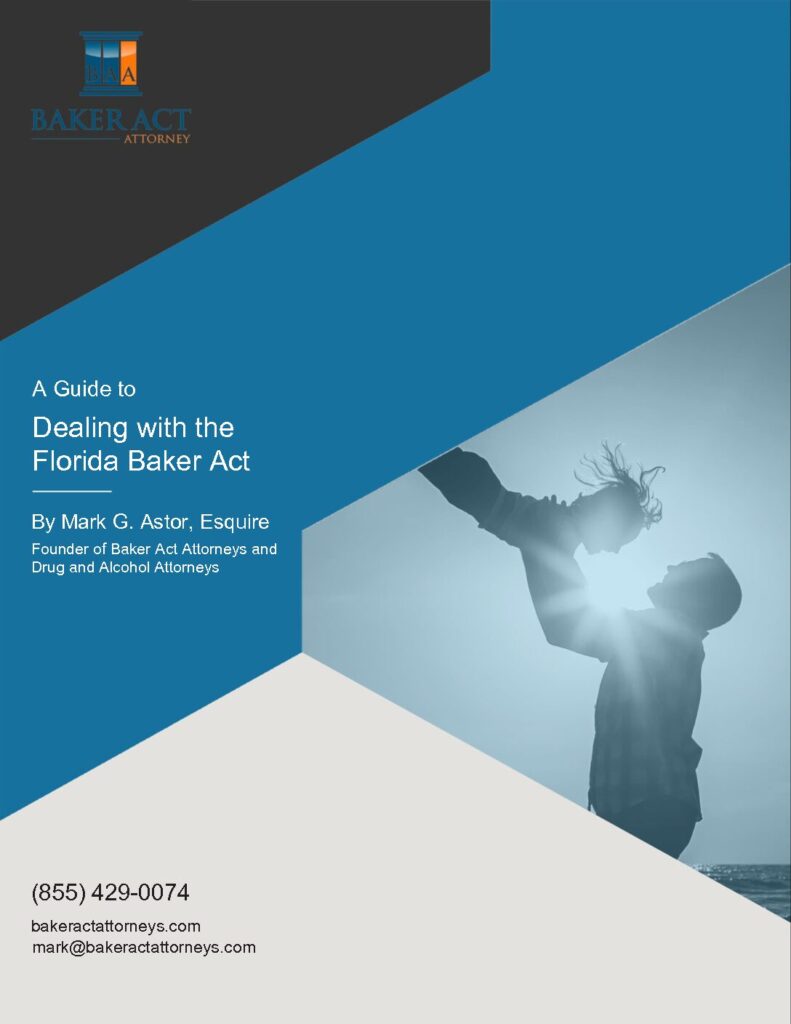100% Confidential Consultation Now
Is your loved one experiencing a mental health crisis? You’re not alone.
Our Florida Baker Act Attorney, Mark Astor, is ready to help you. We’re waiting for your call, and we can start work to secure the release of your loved one today!
Call us now if a law enforcement officer, mental health professional, or court has sent your loved one to a facility, and they are currently being held there against their will.
Understanding the Florida Baker Act
The Baker Act, also known as the Mental Health Act, gives the State of Florida authority to take custody of somebody, without affording them any due process, when they appear to be suffering from a mental health crisis.
72 Hours or Longer
The Baker Act mandates, the state licensed receiving facility prove that your loved one meets criteria to be detained for at least 72 hours. At the end of the 72-hour detention period, which does not include weekends or holidays, the facility can petition the court for an order of involuntary placement, which can subject an individual to a maximum possible detention period of up to 6 months.
Act Immediately for the Best Outcome
The first 72 hours is the BEST time to secure your loved one’s release from a Baker Act detention, before the state has a chance to get a court order for extended detention.
Mark Astor helped save my son’s life after he was Baker Acted in Florida. He has been a Godsend to us, I highly recommend Mark if you’re faced with a Baker Act situation. Cannot thank him enough!!!Mary T., West Palm Beach, FL
BAKER ACT LAWYERS FIGHTING INVOLUNTARY HOLD FOR YOU & YOUR LOVED ONES IN THE STATE OF FLORIDA
Watch all of our Baker Act video questions & answers here
Prevent Long-Term Involuntary Hold
If the treatment facility where your loved one is held gets to the court before you have an opportunity and petitions, the State of Florida could start making decisions on their behalf. If this occurs, your loved one could be held in a facility for up to six months while they receive mandated treatment from a psychiatric nurse, clinical social worker, mental health counselor, or clinical psychologist.
Help Them When They Can’t Help Themselves
You want what’s best for your loved one as they could be mentally ill or experiencing a substance abuse impairment that’s had a debilitating effect on their health. Your loved one may be hurting themselves, others, or making threats that you’re taking very seriously. Drugs and alcohol could be involved, and substance abuse could be fueling their mental health issues.
Two Critical Choices Right Now
Whichever situation your loved one is in, they might not know how to help themselves, which could lead to them being sent to a facility. At this point, you have two decisions:
- Let circumstances play out and see what the facility and possibly the state will do.
- Call an experienced Baker Act attorney to help you. They can file an emergency Petition for the Writ of Habeas Corpus with the local Florida Circuit Court to ensure an emergency release hearing is held. If you select this option, you could have a greater say in what happens to your loved one.
Above all else, you want your loved one to get the help they need, whether that means enrolling them in an outpatient or inpatient program, finding them a therapist, or ensuring they take the proper medication. You believe this is a private family matter and that your loved one should be part of the decision-making process. You don’t think the state or mental health professionals who don’t truly know your loved one should get involved. You know it’s just not right for your family member or friend.
Our Baker Act Attorneys will take immediate legal action as soon as you call us. We will let the facility know that we are representing your loved one, and then we will take all the necessary steps to prevent the facility from filing a petition.
Have questions about your gun rights with a Baker Act?
Read here
Whether you need a Baker Act attorney right away or you have questions about an involuntary placement, call us at 855-429-0074 for a confidential consultation now. (Consult during business hours)

A Guide to Dealing with the Florida Baker Act
Check out our eBook Here
Call Us Today. Consultation During Business Hours.
Why Choose Us
Top reasons why clients hire Baker Act attorney Mark Astor’s team instead of anybody else:
01) Over 20 Years of Experience
Our team has over 20 years of dedicated service to providing exemplary legal services to those suffering from mental health, substance abuse impairment, or disorders and their family members. We understand Baker Act cases and Florida Statutes at a granular level and have extensive experience dealing with law enforcement officers in these exact circumstances.
02) We Get Results Fast
Baker Act can be released in the shortest possible time. If we act early, there is a substantial likelihood of achieving a superior outcome and securing the release of your loved one. We recommend calling our team as soon as you become aware that your loved one has been held under the Baker Act.
03) Immediate Action Now
We act immediately on your behalf to inform hospitals and physicians at the receiving facility that we represent you and that our team is taking legal action to obtain the release of your loved one. We are prepared to file an emergency Petition for the Writ of Habeas Corpus with the local Florida Circuit court to force an emergency release hearing.
04) Compassionate Approach to Mental Illness
We understand mental illness and the challenges that your family are experiencing during this difficult time as you encounter the Baker Act. Our team will help secure the release of your loved one from Baker Act confinement after their recent behavior to enable them to access the treatment and discharge planning they need. In our experience, mental health treatment can be readily accessed outside of an involuntary environment through your family therapist and other mental health professionals.
Can’t call or chat now?
Complete the form below to receive a confidential initial consultation with a Baker Act Lawyer.
*Consultations with one of our attorneys may require payment of a fee as we don’t always offer a free initial consultation.
100% Confidential

Mark G. Astor, Baker Act Lawyer
FAQs - Common Questions for Baker Act Lawyers
Can you help whether my loved one is held at a public or private facility?
Yes! We can assist with securing the release of your loved one regardless of whether the facility where they are being held is private or publicly owned.
My loved one has prior mental health problems can you still assist?
Absolutely. We understand that mental illness is extremely challenging, and episodes can reoccur. We’ve assisted many Baker Act clients who have loved ones with prior mental illness or law enforcement incidents. Our professional team can help to secure their release from a Baker Act regardless of the patient’s clinical record or his or her mental illness.
How much does a Baker Act Lawyer cost?
The cost of a Lawyer can vary based on the individual circumstances of your case and the background of your loved one. However, we can provide you with a fee for full transparency of all of the work required to help secure the release of your loved one when you call us. We always aim to provide a conscientious explanation of the process and costs involved.
What does involuntary examination mean in Florida?
In Florida, involuntary examination refers to the 72-hour Baker Act period. Individuals that behave in an “irrational” way and could be “capable of bodily harm to themselves or others” are held for a period of involuntary examination. We can assist with all matters relating to the involuntary examination hold period. Our team has a deep knowledge of all legal issues surrounding involuntary examination, and individuals who have refused voluntary examination.
What is the criteria for involuntary examination in Florida?
In Florida, the general criteria for involuntary examination are:
“There is a substantial likelihood that without care or treatment the person will cause serious bodily harm to himself or herself or others in the near future, as evidenced by recent behavior.”
Evidence must exist from a law enforcement official, physician, clinical psychologist, psychiatric nurse, or clinical social worker to support the Baker Act involuntary examination.
Does your firm operate in West Palm Beach?
Absolutely, we regularly assist clients based in West Palm Beach, Florida, and individuals throughout the entire state of Florida, with Baker Act issues relating to substance abuse and mental health. Call our team today to discuss your loved one’s matter.
How long has your firm been advising clients on Baker Act Law?
Our team has been providing dedicated support for issues relating to the Florida Mental Health Act for over 20 years. We specialize in helping clients overcome every issue associated with the Baker Act, including related legislation like the Drug Services Act or Marchman Act. Over the years, we’ve encountered every issue, from express and informed consent to hundreds of involuntary examinations.
What is involuntary status?
Involuntary status is the terminology used to describe the status of a person that is held under the Baker Act for involuntary examination at a mental health facility.
How long can someone be Baked Acted in Florida?
In Florida, individuals can be held for involuntary examination for a maximum of 72 hours, excluding holidays that may incur additional times due to accessing administrative services.
Does a Baker Act stay on your record permanently?
Yes. An involuntary examination under the Baker Act will likely appear on medical records and police records.
How do you fight Baker Act in Florida?
The best way to fight an involuntary examination under the Baker Act is to immediately discuss your specific matter with an experienced attorney from our team to understand the best approach.
Why does the Baker Act exist?
The Baker Act is designed to assist members of the community that have failed to voluntarily seek treatment for mental health issues and require an involuntary assessment to protect themselves or members of the community. However, the powers of the Act are broad and can be misused by law enforcement officers or mental health professionals.







